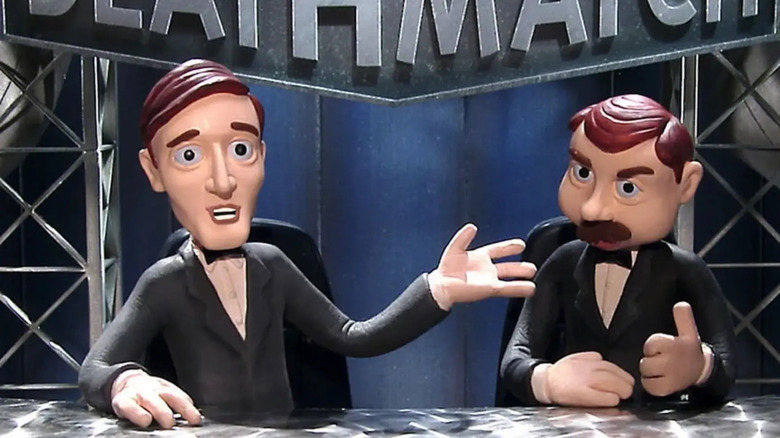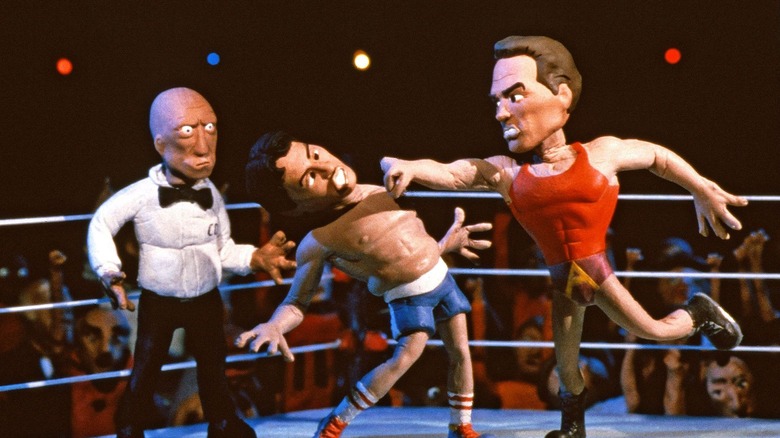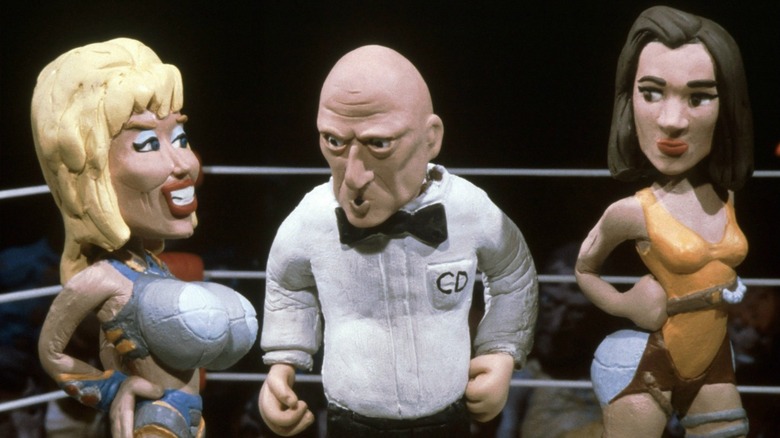Why A Brilliant Star Trek Parody On MTV Was Pulled Last Minute
There is a very basic (and very dumb) question right at the heart of MTV's 1998 animated series "Celebrity Deathmatch": Who would win in a fight? It was a series based very directly on conversations held while extremely high while talking about one's favorite/least favorite celebrities, and who would best whom in hand-to-hand combat. "Celebrity Deathmatch" visualized such fights in a well-organized, animated pro-wrestling ring, where the celebrities in question could outwardly murder each other. For anyone who has ever taken a big bong rip and asked, "You think Marilyn Manson could take Charles Manson in a fight?", "Celebrity Deathmatch" was the series for you.
The series was created by Eric Fogel, who had created the MTV animated series "The Head" (the one that aired with "The Maxx"), and the pairings he and his writers invented were often ingenious. The fight between Penn & Teller and Siegfried & Roy is a fun one. Some felt like they were allowing known pop-cultural conflicts to actually resolve themselves, like David Letterman vs. Jay Leno or Spike Lee vs. Quentin Tarantino. There were political matches. Bill Clinton wrestled Kenneth Starr, and Hilary Clinton wrestled Monica Lewinsky. Others team-ups, though, were just offensive. Dolly Parton vs. Jennifer Lopez doesn't make sense on paper, until you realize that it was a "big boobs" vs. "big butt" conversation. (The series never made any claims toward intelligence.)
Some of the fights made perfect sense, though. Arnold Schwarzenegger vs. Sylvester Stallone is a match-up that any '80s action film junkies could easily understand. Readers of 1990s tabloids would certainly get why Bruce Willis and Demi Moore would be pitted against Tom Cruise and Nicole Kidman.
One obvious pairing, however, never came to pass. There was never an episode of "Celebrity Deathmatch" that pitted Captain Kirk from "Star Trek" against Captain Picard from "Star Trek: The Next Generation." On the Animated World Network website in 2012, Fogel explained very clearly why MTV avoided such an obvious match: Its parent company wouldn't allow it. Which was odd, because the same parent owned both franchises.
Why didn't Kirk ever fight Picard?
It should be noted that the show's match-ups were all wholly unauthorized, presented under the auspices of satire. The celebrities in question were typically voiced by sound-alikes, and one can assume that MTV took only whatever minimum legal precautions they needed to use certain celebrity's likenesses. Some celebrities refused to lend their likenesses along the way, of course, but given that the show lasted a whopping 93 episodes (featuring three matches each), "Celebrity Deathmatch" was clearly able to easily sidestep frequent litigation.
But in the case of "Star Trek," Fogel and the rest of the show's legal crew were given a strict hands-off decree. Indeed, Fogel said that Paramount rejected him outright when he asked to do a Kirk vs. Picard match. Paramount owned the rights to "Star Trek," though, and both Paramount and MTV were, at the time, owned by Viacom, so the refusal was baffling. Also, Paramount had already made their own Kirk-meets-Picard movie with "Star Trek: Generations." Fogel said it was one of the most disappointing refusals he ever received. He recalled the setup for the match in question, writing:
"The match was to be featured in our Sci-Fi Spectacular and I'm pretty sure that the brains of Trekkies all over the world would have exploded for it: Captain Kirk vs. Captain Picard. This main event match-up was quite far along in our pipeline, as I recall. All of the voices had been recorded, the storyboards had been approved, and we were about to go into animation. William Shatner himself, a personal friend of 'Deathmatch' writer Chris Kreski, blessed the episode."
Kreski had co-written several of Shatner's biographies. It seemed that everything was lined up. Then the Paramount people gave them a call and shut down the entire episode.
Paramount shut down Celebrity Deathmatch's Star Trek fight
But right when production was about to begin, it was halted. As Fogel remembered:
"And that's when Paramount pulled the plug. A sister company of Viacom (who owns MTV Networks), Paramount, was unhappy with us 'f***ing with their billion dollar franchise,' as they put it. Pretty incredible, considering that everyone and their mother had done a 'Star Trek' parody at that point. Sadly, this complete lack of synergy hurt no one but the fans, denying them of a fantasy battle they could only ever witness on our show."
Things had obviously been a little touchy at Viacom for a while. The initial run of "Celebrity Deathmatch" ended in 2001, but there was still a lot of bad blood at the company. All of that bad blood contributed to a massive company fracture just a few years later. At the 2004 Super Bowl halftime show, one might remember, Janet Jackson and Justin Timberlake became embroiled in the "wardrobe malfunction" scandal, wherein a key piece of Jackson's costume was accidentally removed live on air. The Super Bowl aired on CBS, a Viacom subsidiary, but the Halftime Show itself was produced by MTV. When the scandal broke, blame was flung around the Viacom audiences, and the company's elderly head, Sumner Redstone, decided to calm down the squabbling child companies by pushing them under separate umbrellas. One company had CBS and all the Paramount TV shows, while the other had MTV and Paramount Pictures.
The ironic thing? "Star Trek" TV shows were owned by one company, and "Star Trek" movies by the other. Viacom may not have wanted "Celebrity Deathmatch" to spoof "Star Trek," but interoffice squabbling following the Super Bowl scandal proved that the company was indelicate with "Star Trek" anyway. The companies would eventually re-merge in 2019.


